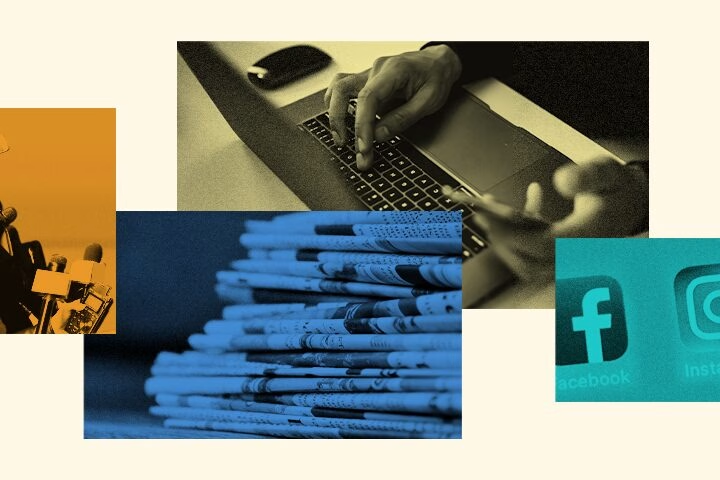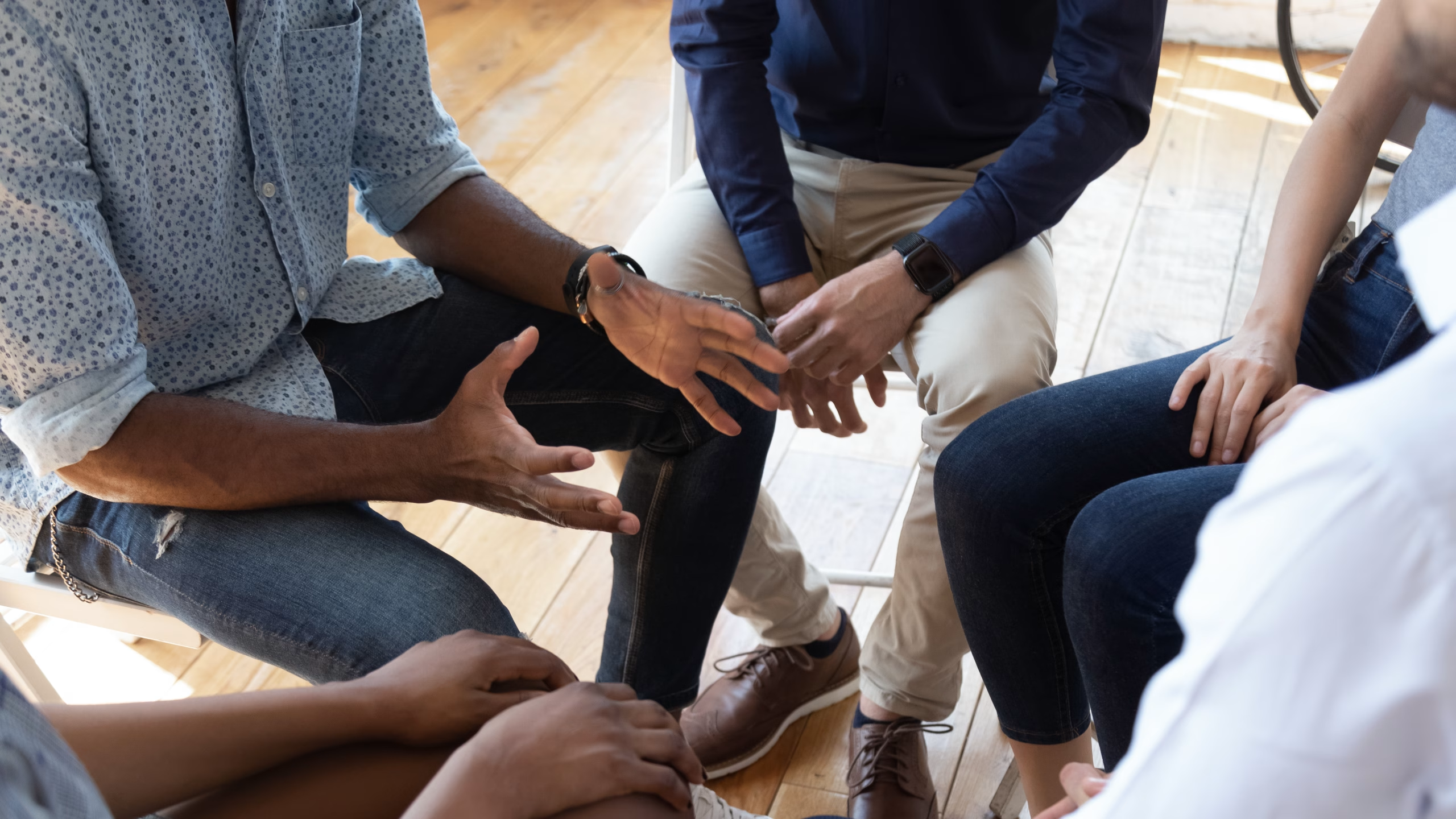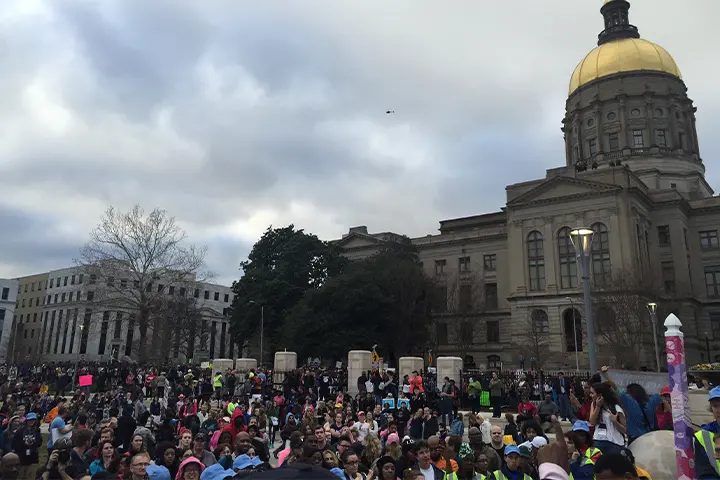Community Disinformation Action Hub
Empower your community to find the facts.

Disinformation threatens free expression, social justice, and health and safety in our communities. It affects each community in unique ways and action from the neighborhood level up is needed. This site is for community leaders and anyone who wants to learn what disinformation is and take action in their community to stop it. Whether you’re an organizer, a faith leader, or a librarian, you’ll find everything you need: guides and tip sheets, easy to understand explainers and definitions, and tools to take action.
The resources here build on PEN America’s extensive work tracking the harmful effects of disinformation over recent years, including landmark reports, partnerships with newsrooms and community organizations, and workshops and resources that have reached tens of thousands.
Disinformation 101
“Disinformation” is a word that gets tossed around a lot and for many people it can be both abstract and intimidating. Just knowing the basics can be immensely empowering for your community.
First up: it’s crucial to understand the difference between disinformation and misinformation:
- Disinformation is false information that is spread with the intent to deceive people or to obscure the truth.
- Misinformation is false information that is spread in error.
The difference is in the intent. Disinformation can be pushed by governments, political parties, commercial interests, and even individuals, with motivations ranging from politics to ideology to profit. It can take the form of text, memes, photos, audio, and video and can spread online and off. Misinformation includes rumors and hearsay that people share with each other, without knowing the information they’re sharing is false. To counter both dis- and misinformation, it’s critical that people have the ability to spot and call out falsehoods when they start spreading.
Key Concepts
How Disinformation Harms
Disinformation can cause psychological and physical harm—for example, by causing anxiety and anger, or by tricking people into taking dangerous alternative medicines or engaging in acts of violence.Disinformation disenfranchises and disempowers. It harms free expression, activism, and democracy by:
Racialized and Gender-Based Disinformation
Disinformation often targets historically marginalized and oppressed communities to exploit and expand inequities. Learning to recognize and call out racialized and gender-based disinformation is a powerful first step in countering it.
Why Disinformation Works
Disinformation is effective because it exploits psychological vulnerabilities that we all share. The good news is that being aware of these tricks helps communities defend against them. Here are the most important ones:
What Disinformation is Not
It’s important that satire, parody, and art aren’t considered examples of disinformation. Overly broad definitions of disinformation can quickly lead to censorship and stifle creativity. It’s important to take care to recognize nuance, motive, context, and more in order to fully address the problem.
Guides to Spot and Stop Disinformation
-
Media Literacy Toolkit
-

Herramientas de Alfabetismo Mediático de PEN America
-

How to Talk to Friends and Family Who Share Misinformation
-

Cómo Hablar con Amigos y Familiares Que Comparten Información Errónea
-

PEN America’s Guide for Combating Protest Disinformation
-

PEN America’s Guide on COVID-19 and Disinformation
Media Literacy, Equity, and Justice
Disinformation threatens social equity. Media literacy and disinformation defense are important tools to promote equity and justice.
Connecting the dots:
- Uninformed citizens are disempowered citizens, and disempowered citizens are less likely to be civically engaged, vote, or make their voices heard in pursuit of justice.
- Disinformation seeks to deepen divisions in order to preserve societal inequities and even turn underserved communities against each other. Conspiracy theories and other forms of misinformation jeopardize opportunities for civic discourse, leading to polarized and distrustful communities and can amplify intolerance and misinformed, often racist, sexist, or otherwise discriminatory ideas or messages.
Media literacy and disinformation defense are pivotal to reversing racist, sexist, and other discriminatory narratives. To dive deeper, check out these PEN America resources and videos:
- The pandemic and compromised information systems disproportionately harm communities of color. Learn how in this FAQ and then check out our community-driven approach to fighting vaccine misinformation with communities of color.
- Learn How Misinfo & History Affect BIPOC Trust in the COVID Vaccine in this virtual panel discussion with misinformation experts, movement journalists, and medical professionals.
- Meeting people where they’re at is crucial, and that includes language accessibility. For example, Spanish-language misinformation is fact-checked with less frequency than English, so Bilingual Media Literacy Workshop offerings are imperative.
Conversations about misinformation can be tough, but as a trusted source you have the power to guide your family and friends down the healthy information pathways.
Taking Community Action Against Disinformation
Disinformation is becoming more sophisticated and increasingly targeting specific communities. It’s up to each of us to keep our communities informed about it, and reduce its impact. For individuals and communities, this means building media literacy, finding and verifying credible information, and navigating conversations around mis- and disinformation.
Key Concepts
Building Media Literacy
Being media literate means knowing how to judge the quality of information you receive and how to seek out high quality content. The term “media literacy” is sometimes used interchangeably with “digital literacy” or “news literacy.” Our partners at the National Association for Media Literacy Education define it this way:The ability to access, analyze, evaluate, create, and act using all forms of communication. In its simplest terms, media literacy builds upon the foundation of traditional literacy and offers new forms of reading and writing. Media literacy empowers people to be critical thinkers and makers, effective communicators and active citizens.Regardless of the definition, media literacy is essential to democratic participation and the ability of individuals and communities to advocate for themselves. A lack of media literacy means vulnerability to disinformation and the disempowerment and harms that come with it.Register for an upcoming virtual event on PEN America’s Media Literacy program page, Knowing the News, and check out our curricular approaches to a variety of topics such as elections, public health, and social justice.
Finding Quality Sources of Accurate Information
It is important to refer to a diversity of news sources—both local and national, nightly news and nonprofit news, for example—and it is equally important to learn to evaluate the trustworthiness of those sources, discerning fact-based reporting from editorial writing or even sponsored content published for partisan political purposes. These nuances can be difficult to hone in on. Here are some helpful guidelines:
Verifying Online Content
As technology becomes more sophisticated, the process of creating doctored images, manipulated videos, or fake social media accounts becomes easier and more accessible. Check out these tips and tools for detecting false content and verifying accurate information.Photos and videos may be presented out of context by miscaptioning or misidentifying them, or doctored to distort their meaning. Before sharing or validating unverified images, run a Google image search to learn more about the image’s origin. This can be especially useful when you suspect an image may have been doctored to fit a certain narrative or in case an image has been miscaptioned or cited out of context. Reputable news organizations and even fact-checking organizations have sophisticated tools to authenticate video, so their feeds can be a useful guide.More tools:Spreaders of disinformation often create fake, shadow accounts of fabricated or famous people in order to spread their false content far and wide, or anonymously. If you encounter a suspicious account, here are some ways to check its authenticity:Fact-checking health information and statistics, especially during a public health crisis, can be tricky as the science evolves and we learn more collectively every day. Consistency is important, as is inspiring and instilling trust in credible health organizations and medical professionals. Validating people’s fears and anxieties is also an important step in working together to access accurate information.For health information, refer to trusted medical institutions like the Centers for Disease Control and Prevention (CDC.gov) or the World Health Organization (WHO.int). Some other reliable sources of information and tools to help you get there:
Debunking and Prebunking
It’s possible to head off disinformation in advance through “prebunking” or confront it through “debunking.” These are really effective tools for community leaders to have at the ready:There are a wealth of online fact-checking tools to help with prebunking and debunking available online. Here are a few we recommend:
Having the Talk About Misinformation with Family and Friends
Like many polarizing topics, it can be difficult to approach conversations about what constitutes false information (and what doesn’t), especially when two parties don’t share the same understanding of the facts. But leaning into these exchanges is crucial to countering the divisive effects of misinformation. Here are some helpful tips to guide your efforts: Before you attempt to correct someone who has shared what you believe to be mis- or disinformation, try to fact-check the story yourself. Check out the “About Us” page on unfamiliar sites and use “lateral reading”—run the claim through Google or another search engine alongside the terms “true,” “false,” or “hoax.” Also make sure to practice “click restraint”—don’t just automatically click the first search result—because often misinformation gets repeated in search results. Pause and consider which source seems most reliable.Preparing thoughtful responses to some of the most frequent misinformation narratives around whatever topic you’re discussing can be a helpful step to take in advance. When redirecting someone to credible facts, reference reputable sources as well as trusted community leaders like journalists and organizers, and remember that you can be a trusted source too.If you message someone about their social media post containing false information or approach someone in-person, take care to use a supportive and positive tone. Otherwise, you risk alienating the person, making them less receptive to the information you’re trying to share. And if you’re engaging via social media, consider reaching out through a private message rather than publicly correcting, which can sometimes be perceived as shaming and may also just further amplify the disinformation.However you engage, do so with empathy. Call people in as opposed to calling out. For more advice on how to do this, check out our discussion with misinformation expert Bridget Todd.Sometimes the conversation may not go well. Your friend, family or community member might get defensive when met with your fact-check, and the exchange may no longer be constructive. If it seems like the conversation is moving in that direction, just remember that it can be hard for people to accept corrections, and it is tough to change attitudes—no matter how well-grounded your comments are.
The Disinformation Defense Toolkit
The Disinfo Defense Toolkit, co-curated by PEN America and ReFrame, compiles resources for organizers and advocates to help their communities fight back against the harmful effects of misinformation.
Empowering Communities On & Offline
Empowering Communities On & Offline offers concrete solutions for organizers stemming the spread of misinfo in their communities.
Talking To Friends and Family
It’s important to talk to friends & family who share misinformation.
Spanish: Cómo Hablar con Amigos y Familiares Que Comparten Información Errónea